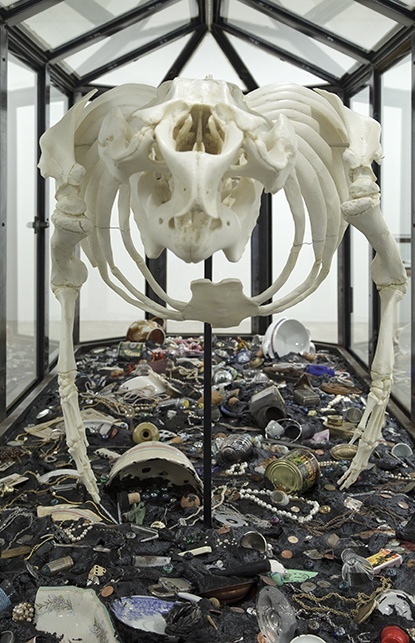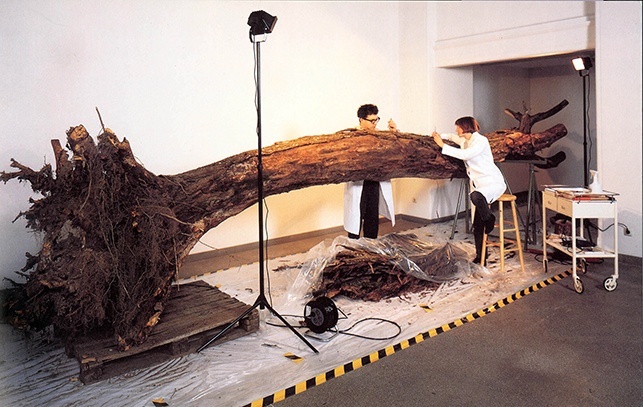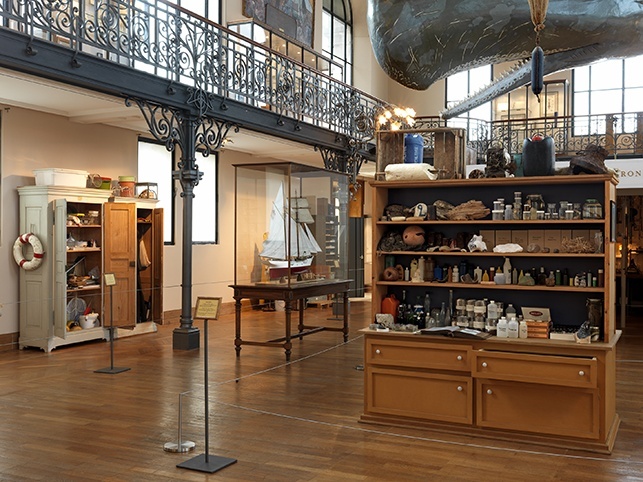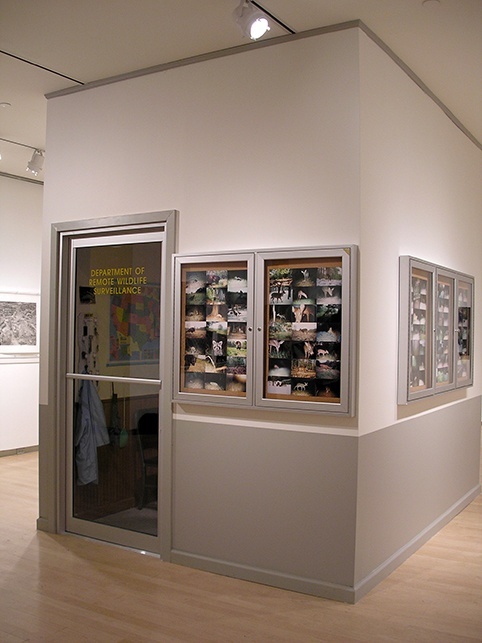
In this portfolio of curated texts and visual material, D. Graham Burnett and Mark Dion—who shared a studio for a year while each working at the intersection of artistic practice and the history of science—juxtapose a collection of telling historical quotations with images that evoke collective fantasies of rational inquiry into nature. The result explores the rhetorical dimensions of both representing science and opining as to its purpose.
●
 Trichechus manatus latirostris, 2013
Trichechus manatus latirostris, 2013
After all, what is science for, if it be not to bring man and nature to embrace each other rapturously, lovingly, responsively?
—Hilderic Friend, “New World Nature-Lovers,”
Hardwick’s Science Gossip, 1891
●
 The Great Munich Bug Hunt, 1993
The Great Munich Bug Hunt, 1993
Pestilence follows dirt; health, cleanliness. Be clean, and the laws of God are on your side. Live in miasma—filth—and you are against the law, and as surely as the lightning strikes the steel, so surely you will suffer. Can anyone doubt, then, with regard to our duty to the poor, who live in places which to breathe in is a rapid death? It is not to level the sties of Bermondsey and St Giles to build fine houses in and to drive the wretched inhabitants to places fouler and more hideous still; but it is to supply baths, water, to clean, and clean, and clean, to purify the rivers, to dig the sewers deep and roof them well, to provide sewerage for the poor, to urge government to obey sanitary laws of old, to tell the rich to give and give till they can cleanse the poor; and what is science for but this?
—Anonymous, “The Genius of the Reverend Charles Kingsley,”
The Eclectic Magazine of Foreign Literature, Science, and Art, 1857
●
 Scala Naturae, 1994
Scala Naturae, 1994
What is science for, if not to modify the associations of people and things?
—Bruno Latour, Pandora’s Hope, 1999
●
 Library for the Birds of Massachusetts, 2005
Library for the Birds of Massachusetts, 2005
What is science for, if not to sustain us against the intoxications of night and the temptations exercised by the enchantress appearance?
—Vladimir Jankélévitch, Music and the Ineffable, 1961
●
 Curiosity Cabinet at the Oceanographic Museum of Monaco, 2011
Curiosity Cabinet at the Oceanographic Museum of Monaco, 2011
The first responsibility of the University is to do its part in answering the gravest of social questions: At which end of the ship shall we place the bowsprit? That is, shall we go forward or backward? Going forward means that we search for the causes of undesirable social conditions. This requires us to do and not merely discover and deplore. When nation-wide defects of economy are joined to nation-wide effects of an unbalanced natural environment, we call to our aid two forces: science and general control for the general good rather than individual control for the individual good. What is science for if not to meet such a situation?
—Isaiah Bowman, “The Twelve Houses of Heaven,” 1941
●
 Bureau of Remote Wildlife Surveillance, 2006
Bureau of Remote Wildlife Surveillance, 2006
What is science for, if it does not equip us to face and absorb the shocks of the future?
—Indira Gandhi, Selected Thoughts, 1985
●
 Marine Invertebrates, 2013
Marine Invertebrates, 2013
What is science for, if not to advise a lethal chamber?
—Emma Goldman, The Social Significance of Modern Drama, 1914
●
 Linnaeus, 1992
Linnaeus, 1992
What is science for? When this question is squarely and thoughtfully faced, scientists will agree that science exists for man, and not for itself alone.
—U.S. Senate, “Hearings on Science Legislation,”
Subcommittee on Military Affairs, 1945
●
Art credit: All images courtesy of Mark Dion and Tanya Bonakdar Gallery
In this portfolio of curated texts and visual material, D. Graham Burnett and Mark Dion—who shared a studio for a year while each working at the intersection of artistic practice and the history of science—juxtapose a collection of telling historical quotations with images that evoke collective fantasies of rational inquiry into nature. The result explores the rhetorical dimensions of both representing science and opining as to its purpose.
●
After all, what is science for, if it be not to bring man and nature to embrace each other rapturously, lovingly, responsively?
—Hilderic Friend, “New World Nature-Lovers,”
Hardwick’s Science Gossip, 1891
●
Pestilence follows dirt; health, cleanliness. Be clean, and the laws of God are on your side. Live in miasma—filth—and you are against the law, and as surely as the lightning strikes the steel, so surely you will suffer. Can anyone doubt, then, with regard to our duty to the poor, who live in places which to breathe in is a rapid death? It is not to level the sties of Bermondsey and St Giles to build fine houses in and to drive the wretched inhabitants to places fouler and more hideous still; but it is to supply baths, water, to clean, and clean, and clean, to purify the rivers, to dig the sewers deep and roof them well, to provide sewerage for the poor, to urge government to obey sanitary laws of old, to tell the rich to give and give till they can cleanse the poor; and what is science for but this?
—Anonymous, “The Genius of the Reverend Charles Kingsley,”
The Eclectic Magazine of Foreign Literature, Science, and Art, 1857
●
What is science for, if not to modify the associations of people and things?
—Bruno Latour, Pandora’s Hope, 1999
●
What is science for, if not to sustain us against the intoxications of night and the temptations exercised by the enchantress appearance?
—Vladimir Jankélévitch, Music and the Ineffable, 1961
●
The first responsibility of the University is to do its part in answering the gravest of social questions: At which end of the ship shall we place the bowsprit? That is, shall we go forward or backward? Going forward means that we search for the causes of undesirable social conditions. This requires us to do and not merely discover and deplore. When nation-wide defects of economy are joined to nation-wide effects of an unbalanced natural environment, we call to our aid two forces: science and general control for the general good rather than individual control for the individual good. What is science for if not to meet such a situation?
—Isaiah Bowman, “The Twelve Houses of Heaven,” 1941
●
What is science for, if it does not equip us to face and absorb the shocks of the future?
—Indira Gandhi, Selected Thoughts, 1985
●
What is science for, if not to advise a lethal chamber?
—Emma Goldman, The Social Significance of Modern Drama, 1914
●
What is science for? When this question is squarely and thoughtfully faced, scientists will agree that science exists for man, and not for itself alone.
—U.S. Senate, “Hearings on Science Legislation,”
Subcommittee on Military Affairs, 1945
●
Art credit: All images courtesy of Mark Dion and Tanya Bonakdar Gallery
If you liked this essay, you’ll love reading The Point in print.